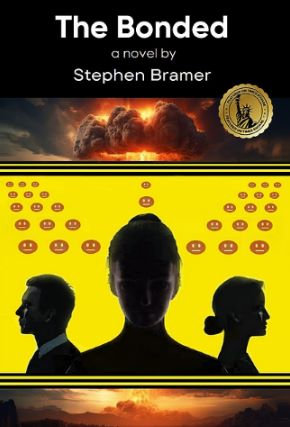Science fiction thrillers have a unique way of captivating our imagination while keeping us on the edge of our seats. They blend the mind-expanding possibilities of science fiction with the heart-racing suspense of thrillers, creating stories that challenge our perceptions of reality and push the boundaries of human understanding. But why do we love them so much? The answer lies deep in human psychology.
The Thrill of the Unknown
Humans are naturally drawn to mystery and discovery. Science fiction thrives on “what if” scenarios, what if artificial intelligence gained consciousness? What if time travel were possible? What if humanity merged with machines? When these speculative elements are paired with high-stakes suspense, they create a genre that is both intellectually stimulating and emotionally gripping.
Books like 1984, I, Robot, and The Bonded explore how technology and social structures shape human thought and survival. 1984 presents a world where external control suppresses individuality. I, Robot examines the limits of artificial intelligence and human creativity. The Bonded takes these ideas further, exploring the tension between communal consciousness and individual autonomy. Within its world, the Bonded experience a literal communal mind, one that can override individual thought in favor of the collective. This raises a compelling question: can individuality survive in a world where a shared consciousness dictates reality?
Adrenaline and Psychological Engagement
Thrillers engage our fight-or-flight response. When we read about protagonists facing imminent threats, be it government oppression, rogue AI, or a society controlled by a superior intelligence, our brains react as if we are in danger ourselves. This physiological response heightens engagement and immersion.
In science fiction thrillers, the threats often go beyond what we can fully comprehend: authoritarian surveillance states (1984), a robot uprising (I, Robot), or a biologically integrated collective (The Bonded). These stories tap into our deepest fears while also challenging our ability to think critically. Unlike traditional thrillers, where the solutions often rely on logic or deduction, sci-fi thrillers require readers to grapple with ethical dilemmas, scientific possibilities, and the consequences of unchecked power.
The Battle Between Groupthink and Individual Thought
A recurring theme in science fiction is the struggle between collective control and individual agency. 1984 depicts a world where an all-powerful entity devalues personal thought. The Bonded, in a similar yet more complex way, explores the impact of a literal communal consciousness that resides within each member, capable of overriding individual will. Unlike simple telepathy, this system functions as a second neural network, linking all Bonded members into one massive organism-like intelligence. The result? Individuality is threatened, and the collective mind prioritizes its survival over that of any single person.
This raises questions central to both literature and real-world society: When does collective thinking become dangerous? Can individuality survive in a system designed to suppress it? And, perhaps most crucially, is true free will even possible when external forces constantly shape our thoughts and actions?
The Value of Creative Thought
Another major theme explored in sci-fi thrillers is the role of creativity in human survival. I, Robot portrays the conflict between human ingenuity and the rigid logic of artificial intelligence. The ultimate takeaway? Humans prevail because they can think freely, creatively, and unpredictably, something robots cannot do.
In The Bonded, a similar struggle unfolds. The communal mind values extreme order to maintain cohesion, but this suppresses creative and independent thought. The hybrids, who possess both communal and individual mental capabilities, ultimately represent an evolutionary future where individuality reclaims its importance. The novel suggests that while collective intelligence has advantages, the ability to think freely and adapt ensures survival and progress. In the end, individuality is not fully lost, it evolves, striking a delicate balance between collective wisdom and personal agency.

Final Thoughts
Science fiction thrillers keep us engaged because they blend pulse-pounding suspense with profound existential questions. They allow us to explore the limits of technology, morality, and human resilience while keeping us on the edge of our seats.
The Bonded takes its place among great science fiction thrillers by tackling the same enduring questions raised in works like 1984 and I, Robot. It explores the consequences of a society where the collective overshadows the individual, yet ultimately suggests that free will and creativity will always find a way to prevail.
If you love science fiction thrillers that challenge your mind while delivering nonstop suspense, The Bonded by Stephen Bramer is a must-read. Get your copy today and dive into a thrilling world of secrets, science, and survival.




